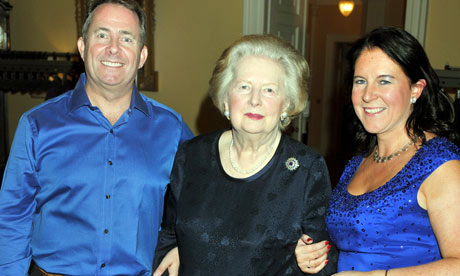Dans un papier bien informé, le journaliste Jamie Doward prend un malin plaisir dans les colonnes du quotidien de gauche britannique The Guardian à révéler les liens étroits entretenus par l'ex-ministre de la Défense Liam Fox avec un réseau de clubs et de fondations nord-américains.
Le journaliste explique bien les mouvements de fonds entre les associations conservatrices états-uniennes, bien financées par des dons généreux d'entreprises et de millionnaires, vers des organisations britanniques partageant les mêmes objectifs mais manquant de financement.
C'est la grande force des groupes d'influence politiques aux Etats-Unis, un financement généreux de la part de personnalités et d'entreprises à un niveau inconnu en Europe. Voici quelques mois, un responsable d'association américaine cherchant à réformer certains aspects de la vie publique dans son pays m'a raconté qu'il envisageait un procès contre un organisme public. Dès que la nouvelle fut rendue publique auprès de ses soutiens, il reçut le jour même un appel lui proposant un don de 250000 dollars. De quoi faire rêver de ce côté-ci de l'Atlantique les responsables de Contribuables associés ou de l'Institut pour la justice.
 |
| Liam Fox and wife Jesme (right) with former prime minister Baroness Thatcher at his 50th birthday party in London. |
Liam Fox's Atlantic Bridge linked top Tories and Tea Party activists
Officially it was a charity; in fact, Fox's thinktank was a meeting place for the movers and shakers of the right wing
Twenty US business leaders assembled in Pittsburgh in October 2006 to pay court to the coming man of British politics. They could have been forgiven for thinking Liam Fox, with his neatly parted hair and clipped Scottish accent, resembled the GP he had once been, rather than a potential Tory leader.
But, although few of the business leaders knew much about the shadow defence secretary, they were familiar with his charity, the Atlantic Bridge. This was the organisation whose patron, Lady Thatcher, was lionised in the US for her support of the free market and American military airbases on British soil. It was the organisation whose members in 2004 were ushered into the White House to be briefed by Karl Rove, George W Bush's special counsel. And it was the organisation whose cocktail parties in the Carlton Club in London and Charlie Palmer's steakhouse in Washington were high points of the transatlantic social calendar.
Shortly after addressing the business leaders at Pittsburgh's Duquesne Club – "the finest city club in the country"– Fox explained that the Atlantic Bridge promoted the special relationship between the UK and the US by creating "a network of individual people who can know one another". He declared: "We are trying to bring people together who have common interests and to recognise that in an ever more globalised economy, we will all be called upon to defend those common interests."
Last week those interests came back to haunt not just Fox, whose fall on Friday rocked David Cameron's coalition government, but also many Tory members of the cabinet, whose extensive links to the Atlantic Bridge are now under scrutiny. The irony is that it took a furore around Fox's friendship with a relatively minor player in the saga – a lobbyist, Adam Werritty – to make these links apparent.
Admittedly, senior Tory cabinet ministers had been scrambling to distance themselves from the Atlantic Bridge long before the scandal brought Fox down. The organisation's website – and that of its sister charity across the Atlantic – has been dismantled. But old caches of the site reveal that, while shadow ministers, George Osborne, Michael Gove, Chris Grayling and William Hague were all on its advisory council alongside Fox, its UK chairman. All four stood down as awkward questions over its political activities, which contravened charity laws, resulted in the organisation being wound up.
But the links to the cabinet do not end there. Cara Usher-Smith, the director of business development at Iain Duncan Smith's Centre for Social Justice, was a former director of the Atlantic Bridge. David Cameron's press secretary, Gabby Bertin, admitted last week that she was paid £25,000 by the US drug giant Pfizer when working as the "sole employee" of the charity. Other senior Tories, notably Michael Ancram and Michael Howard, attended its receptions. Sir John Major gave a keynote speech at one of its US fundraisers. Its formidable connections to leading Tories were eclipsed only by its links to senior members of the US Republican party. The Republican senator for Arizona and Senate minority whip, Jon Kyl, and Jim DeMint, a Republican senator for South Carolina and a leading light in the Tea Party movement, were two powerful American members of its advisory council.
To outsiders, the charity may have appeared to be little more than a social club, keen to throw a party in New York to promote Hague's book on William Wilberforce or hold a dinner for 14 in parliament's Club Room – an apparent breach of parliamentary rules. But the group's members were deeply serious in their beliefs, and Fox was more than happy to promote his neoconservative leanings when abroad.
In a speech to Atlantic Bridge members in New York in November 2002, Fox warned "the natural desire to avoid conflict has been reinforced by an innate pacificism in many sections of western society, especially in continental Europe". He told his audience: "For too many, peace has come to mean simply the absence of war. We cannot allow that corrosive view to go unchallenged."
Fox also used the speech to criticise the NHS, which he said had "responded to a funding increase of almost 11% with only a 2% increase in activity".
He was preaching to the converted. The Atlantic Bridge's addresses and conferences were all about promoting market liberalisation. A typical theme of one conference, held in both Los Angeles and Pittsburgh in July 2006, was entitled "Killing the Golden Goose – How Regulation and Legislation are Damaging Wealth Creation". An earlier address in 2003 asked: "How Much Health Care Can We Afford?"
Members of the Galen Institute, a thinktank which promotes "freemarket ideas in health", attended its conferences while the failed bank Lehman Brothers, sponsored at least one event, as did the powerful neocon thinktank the Heritage Foundation.
But in 2007 the Atlantic Bridge's relationship with big business entered a new realm, one that threatens to pose uncomfortable questions for Cameron and his party. The organisation signed a special partnership with the American Legislative Council (Alec), whose motto is "Limited government, free markets, federalism".
Overseen by Catherine Bray, a former adviser to the climate-change sceptic Roger Helmer, a Tory MEP, the project focused on "providing an arena for young conservative leaders on both sides of the Atlantic to build close personal and professional relationships".
Alec is one of the most powerful lobbying organisations in the US. Funded by the likes of Exxon Mobil, tobacco giant Philip Morris and the National Rifle Association, it holds conventions where legislators mingle with lobbyists. According to the Centre for Media and Democracy, a liberal, non-profit, American-based media research group, it uses these events to wine and dine state legislators and present them with pre-drafted bills drawn up on behalf of its members.
Alec boasts: "Each year, close to 1,000 bills, based at least in part on Alec model legislation, are introduced in the states. Of these, an average of 20% become law." One of its biggest supporters is the Koch Foundation, whose founders, the oil barons Charles G Koch and David H Koch, have funnelled about $55m to climate-denial front groups, according to Greenpeace, and are generous donors to the Tea Party movement.
Alec's involvement with Fox's charity coincided with a large increase in funds to the US arm of his organisation. Accounts show that by 2009 the Atlantic Bridge was bringing in $280,508, more than double the $133,926 it was receiving in 2007.
The huge rise in income, which dwarfed that of its UK sister organisation, coincided with a significant expansion in the charity's advisers and directors. By 2009 Werritty, whom the US accounts list as the (unpaid) UK executive director of the Atlantic Bridge, found himself reporting to a new chief executive officer, Amanda Bowman, the former New York director for the Centre for Security Policy, the neocon think-tank that opposed the planned Park 51 Muslim community centre close to the site of Ground Zero.
Further administrative firepower came with the appointment of an impressive group of well-connected lawyers and lobbyists whose clients operate at the heart of the military-industrial complex. Scott Syfert, a lawyer with Moore & Van Allen, which has represented military, chemical and energy interests, became executive chairman of its executive council. Frank Fahrenkopf, president of the American Gaming Association, which represents casino operators, also joined the council, as did Michael Hintze, an Australian billionaire hedge fund manager who has donated more than £1m to the Tories and whose firm, CQS, has invested in firms with defence contracts. John Falk, a US lobbyist whose company, Firecreek, represents the Kestral Group, one of Pakistan's largest defence firms, joined its board of directors. So did Michael Fullerton, a former US department of homeland security adviser now working for Kestral. Randall Popelka, whose Capitol Bridge lobbying firm represents defence interests, joined as its US executive director.
As the Atlantic Bridge boasted on its website: "We have created a network of like-minded people – in politics, business, academia and journalism." It is hard to escape the conclusion that in the space of five years the Atlantic Bridge went from a small, Tory-leaning charity, dispensing freedom medals in the name of Thatcher, to an influential networking club linking most of the cabinet to powerful business interests, neocons and Tea Party enthusiasts. For Cameron, who preaches the gospel of "compassionate Conservatism", the revelation is embarrassing.
Given the elevated circles he was now moving in, it was hardly surprising that Werritty exploited his new contacts. By 2009 a powerful lobby group, Britain Israel Communications and Research Centre (Bicom), was covering the cost of Werritty's trip to an important security seminar in Israel. The trip was arranged by Bicom's former deputy chairman, Michael Lewis, who donated to Atlantic Bridge and to Fox's Tory leadership campaign in 2005. Bicom's former communications director, Lee Petar, who runs a lobbying firm, Tetra Strategy, put Werritty in touch with the Dubai businessman, Harvey Boulter, whose meeting with Fox triggered the initial furore that triggered his demise.
Werritty's links to another businessman may also attract interest. It has emerged that an obscure company called Pargav financed his trips. Pargav was partly funded by Tamares Real Estate, an investment company owned by Poju Zabludowicz, chairman of Bicom. It was also funded by the Good Governance Group (G3), a private investigations company staffed by former MI6 officers and founded by Andries Pienaar, a South African who once worked for the security giant Kroll.
The Observer has established that Pienaar has extensive interests in the defence sector. G3 boasts the defence contractor BAE Systems as a client, and its sister company, investment firm C5 Capital, of which Pienaar is a director, focuses on the security sector, seeking investment in "niche sectors that mitigate risk and protect assets and lives – such as cyber security, biometrics, detection and communications". C5 is known to have been interested in buying cyber security firms which had contracts with MI5.
Pienaar played a key role in establishing the Sri Lanka Development Trust, whose address was listed at G3's headquarters, and which paid for several of Fox's trips abroad. "We agreed to help Dr Fox because of our longstanding interest and involvement in conflict resolution and reconstruction," the Good Governance Group said in a statement.
Ultimately, Fox paid the price for blurring the lines between his political and personal life. But the warning signs had been there for some time. Eyebrows were raised two years ago when he appointed a former US army captain, Luke Coffey, as his special adviser. Coffey is a member of the Council for Emerging National Security Affairs, a thinktank that promotes US national security and is staffed largely by ex-CIA agents.
The appointment spoke volumes about Fox's thinking. The Lib Dem peer Lord Oakeshott observed: "We are allies of America, but we are not the 51st state."
Fox disagreed.







